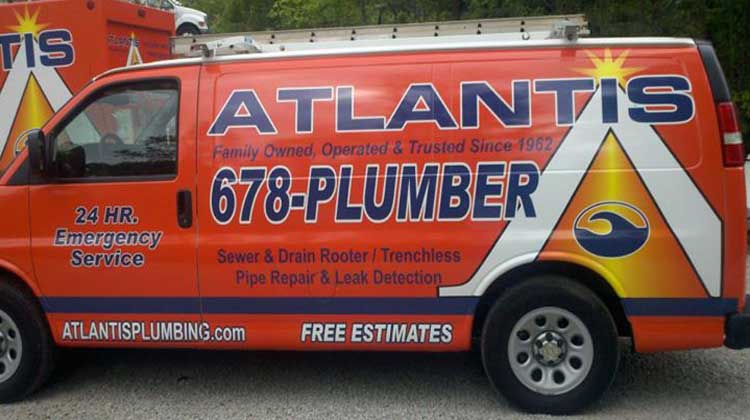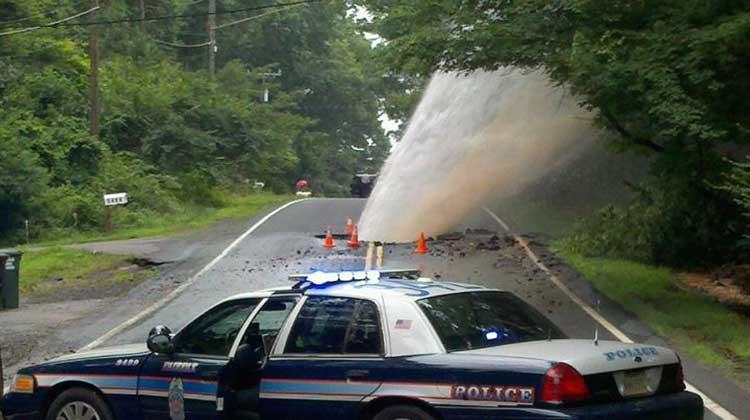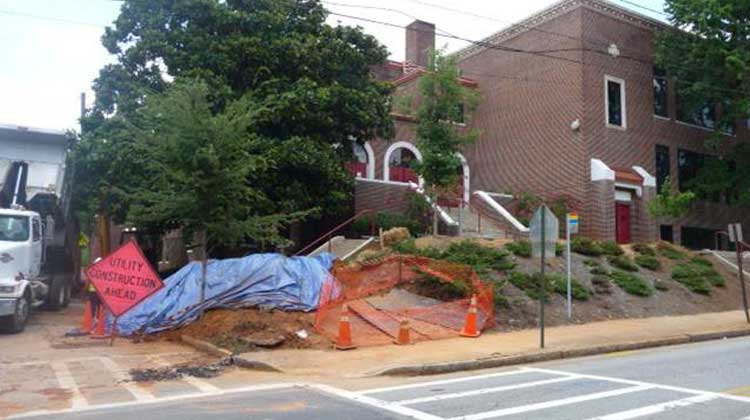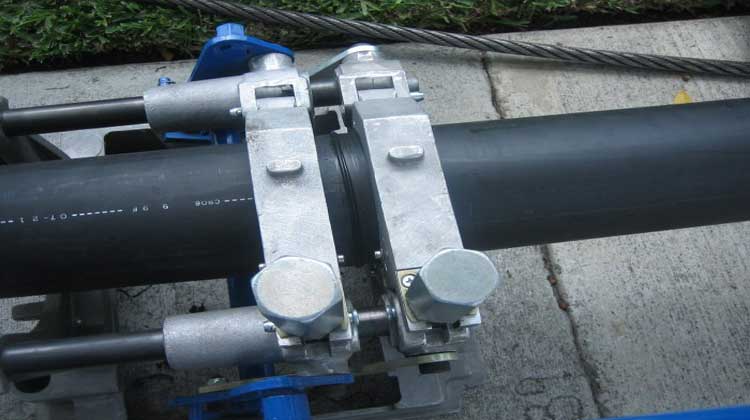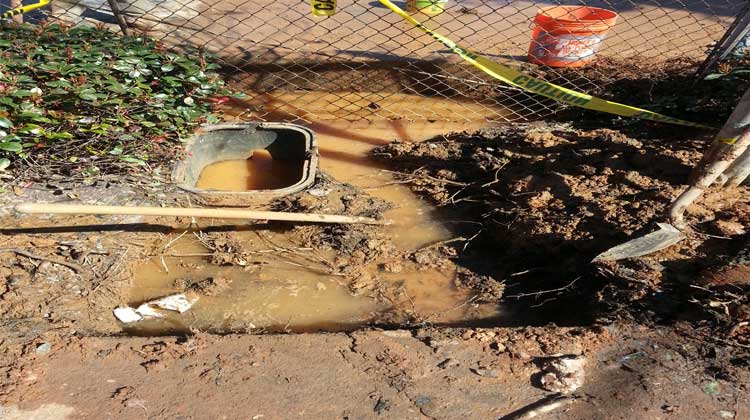Local and trusted by over 70,000 customers in the greater Atlanta Metro - Atlantis Plumbing - call us today for a FREE estimate or second opinion!
Water Line Problems
Water line problems can quickly get out of hand and wreak havoc through your entire home and property. Because water lines are typically hidden in walls and flooring inside, and deep in the ground outside, you could have a serious problem brewing before you can see it. Water line problems can be caused by leaking pipes caused by:
Corrosion – Corrosion is common in older homes, especially if your house was built in the 60’s or before, when galvanized steel was the piping of choice. We now know that galvanized steel corrodes and plugs up, leading to low water pressure at first and finally leaks. Hot water will corrode pipes faster. Since you can’t peek inside of your walls to see what your water lines are piped with, check under your sinks and look at the piping coming out of the wall.
Pinhole Leaks – These tiny leaks can develop over time when acidic water flows through copper pipes. Copper pipes were the choice material for replacing galvanized steel that corrodes easily, however it is not without its own set of problems. Copper piping is expensive to replace, so acidity testing could clue you in to the need for equipment that will treat the water in your home and lower the acidity to prevent future problems. Leaking sections and joints should be replaced quickly to prevent damage to your walls.
Polybutylene – If your home was built between 1978 and 1995, your plumbing may be victim to polybutylene piping. Hailed as a replacement to corrosion-susceptible galvanized steel and expensive copper piping, and cheaper than PVC, polybutylene was discovered to be sensitive to chlorine, which is prevalent in all municipal water systems. After 1995, polybutylene was no longer allowed in building code, but it wasn’t required to be removed, either. The only way to resolve a polybutylene waterline issue is to replace all of it with PEX tubing. An inexperienced plumber or handyman might just replace leaking sections with PEX, leaving you with more problems down the road. Polybutylene water lines don’t just spring leaks – they crack lengthwise and are sensitive to movement from repairs down the line. So, even if you cut out and replace a cracked piece of polybutylene, the mere act of replacing it could cause it to break a foot away.
Frozen Pipes – Water sitting in pipes overnight can freeze, causing the water line to expand and break. This is common during cold nights in pipes that are along outside walls. Outdoor faucets are especially susceptible. Prevention is the key in avoiding costly repairs to burst pipes due to freezing.
Broken Lines – Water lines can be broken by poor self-repair techniques, stress from foundation settling, or from careless digging. Always enlist a licensed plumber to repair pipe and joints – if you can get something tightened or loosened with a simple layman’s tool and a little pressure, it’s time to call a pro before you break a line and send water everywhere, causing costly damage. Your foundation can settle over time, stressing pipes and joints, so if you notice significant settling of your home’s foundation, or cracks in the foundation, you may want to have a plumber inspect your pipes (especially the joints) to see if the move has affected your pipes at all. Of course, you should always have your property marked for buried utilities before digging for any reason. Some pipes are buried deep in the ground, but some are only 16” or so, especially near your foundation. Erosion can reduce the amount of soil covering lines over time.
Of course you can’t peer into your walls to see if you have any problems, so it is important to inspect your home regularly. Check ceilings, walls, and floors for any unusual changes. You might see a discolored area on a ceiling, for example, that might clue you in that there has been water damage. Or you might find mold on the wall in your cupboard under the sink. These are clues that you have water leaking in the wall, and you need to call a licensed plumber fast, before extensive replacement of insulation and drywall is required.
Inspect your siding and foundation frequently, when the weather conditions are dry. Moisture on an outer wall or damage to siding could indicate a leak. Your outdoor water faucets are very susceptible to damage as they are exposed to the elements. When a pipe bursts or cracks near the foundation, you will notice water near the pipe location even though there has not been any recent rain. Be careful not to dismiss this as just a drip – water that pools near your foundation can work its way all the way down and eventually crack your foundation. Of course, this leads to water entering your home through the foundation every time it rains.
A puddle of water in your yard that is not caused by rain is another potentially serious problem. The lines coming into your home are buried in the ground, and when they break, they will leak for some time before you notice a puddle. The problem is, the leaking water will also follow the pipe into your home. A driveway that is wet when it hasn’t recently rained is also a sure sign of a water line problem.
Since you have to pay for all of the water that flows from the water main in your neighborhood, you will notice an increase in your water bill when you have a leak. If your water bill is suddenly significantly higher than ever and you haven’t changed how much water you typically use, you should consider calling a licensed plumber to inspect your property for leaks you can’t yet see.
Sewer Line Problems
Although sewer line problems may be easier to detect and access, they are definitely not enjoyable to repair. Problems can occur inside and outside of your home, as drain lines exit along the same lines as your water intake, and continue through your property to the sewer. Sewer line problems can be caused by a number of things, including:
Roots – When underground pipes develop tiny cracks or fissures, there normally isn’t much of a problem as soil aids in keeping the water inside. Tree roots, however, send out small, hairy tendrils that can invade the smallest crack in a pipe. Once inside the pipe, the tendril grows and takes root in the pipe. To get rid of the problem, you need a licensed plumber to clear the line. Clearing the line requires an auger with sharp, rotating “teeth” that is inserted through a trap in your home, which then travels through the sewer line to power through and destroy tree roots. Often, a chemical is introduced to prevent future growth. Roots surrounding the pipe may need to be dug up in severe cases. When the pipe has been damaged by repeated root clogs, it must be replaced. A camera will need to be threaded through the sewer line to assess the damage. This is a very expensive endeavor, so don’t dismiss a line that frequently backs up, and don’t attempt to fix it yourself with store-bought chemical solutions, which can cause further damage to pipes.
Clogs – Sewer line clogs occur when more debris is pushed through the line than it can handle. This can happen with bathroom tissue, toys or other items that end up in the toilet, feminine hygiene products, coffee grounds and food scraps that slip past the garbage disposal. The clog could be in the drain lines in your home, or farther out in the sewer lines on your property.
Sewer Line Break – If the sewer line leaving your home breaks, you have a serious and dangerous problem. Fumes and contaminants from the line can back up into your home and make you, and your family sick. This is an emergency problem and requires a professional, licensed plumber for repair. The repair becomes more costly the longer you wait as sewage will back up into your home if it cannot get through the broken line.
If you find yourself reaching for the plunger frequently, you may have a bigger problem than just too much paper. A clogged toilet or a sink that won’t drain could be telling you about a clogged sewer line. There is a sewer line cleanout in your home that can be easily cleared, but if that trap is clear and you are still having problems, there could be a more serious problem farther down the line. If you flush your toilet and it backs up into the bathtub, you have a pretty clear indicator of a sewer line clog.
A foul smell in a bathroom, kitchen or basement is a good indicator of a sewer line problem. Inspect the area around drains to see if there is any standing water. Pay attention to the other drains in your home when you flush a toilet or when your washing machine drains. If you have a sump pump that is constantly running or backs up even when not in use, it may be an indicator that there is a clog down the sewer line. Of course, a foul odor near the sewer intake in the street is always a sign of a problem, and you should call your utility company right away.
Check your sewer clean out. This could be in your garage, basement, or outside of your home around the foundation. If water comes up out of the line when you remove the cap, you definitely have a sewer line clog and need to call a professional immediately.
Water lines, whether entering or exiting your home, must be kept clear and in good repair. If you detect even the smallest leak, it is imperative to call a licensed plumber. Taking a wait and see approach is bound to lead to an expensive problem later. When plumbing problems persist without repair, you may have to tear out walls and ceilings to replace pipes, costing you money and leaving your home destroyed. You could have termite issues when wood studs and floor joists sustain water damage, and you might face foundation repair if leaking pipes cause water damage to your home’s foundation. Inexperienced, unlicensed plumbers and handyman services are not the right people to call when you are facing water line problems. You will receive shoddy repair work with no guarantee of the work. You may not receive a thorough inspection or proper diagnosis, just leaving you with more repairs to deal with later.
As a fully licensed Georgia plumbing company, our plumbers have been trained and tested to provide quality water line repair. They will inspect your problem area and surrounding areas for problems that you may not be able to see yet. They will recommend proper course of action and describe the process to you. They will always have safety in mind – yours and theirs. Most importantly, they will be available after the repair work is done should any problems arise or if you have any questions. Trust Atlantis Plumbing for your water line repair needs in Cedartown, Georgia to save headaches and more costly repairs in the future. Know the work will be done right the first time with us. Call today for a Free Estimate.
We Offer Plumbing Services in Cedartown, GA
Bartow County, Cherokee County, Cobb County, Dekalb County, Douglas County Fulton County, Gwinnett County, and Paulding County.
Acworth GA, Atlanta GA, Austell GA, Cartersville GA, Doraville GA, Douglasville GA, Hiram GA, Kennesaw GA, Lawrenceville GA, Lithia Springs GA, Loganville GA, Mableton GA, Marietta GA, Powder Springs GA, Rockmart GA, Roswell GA, Smyrna GA, Tucker GA, Villa Rica GA, Vinings GA, Woodstock GA, and surrounding communities.



